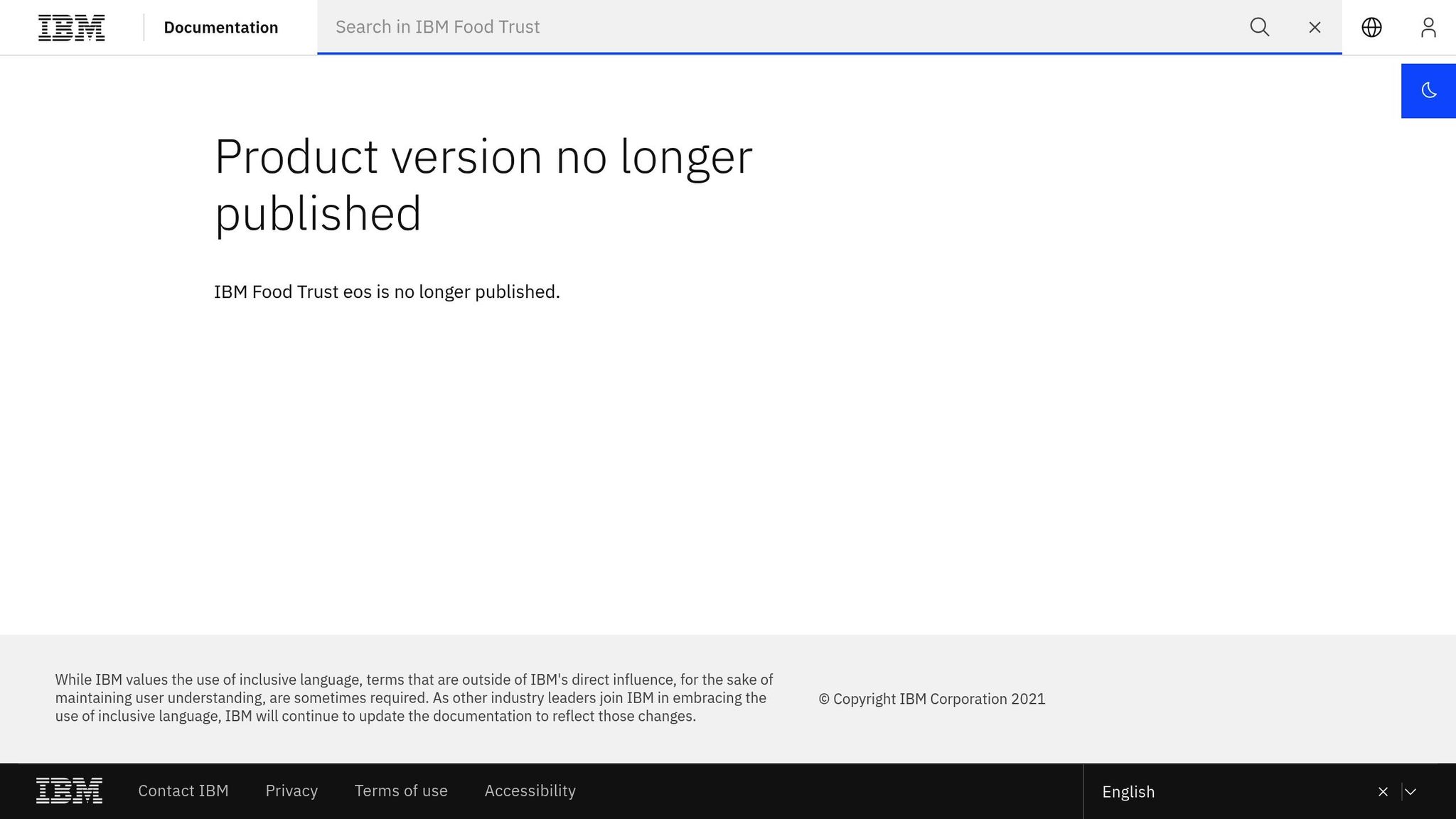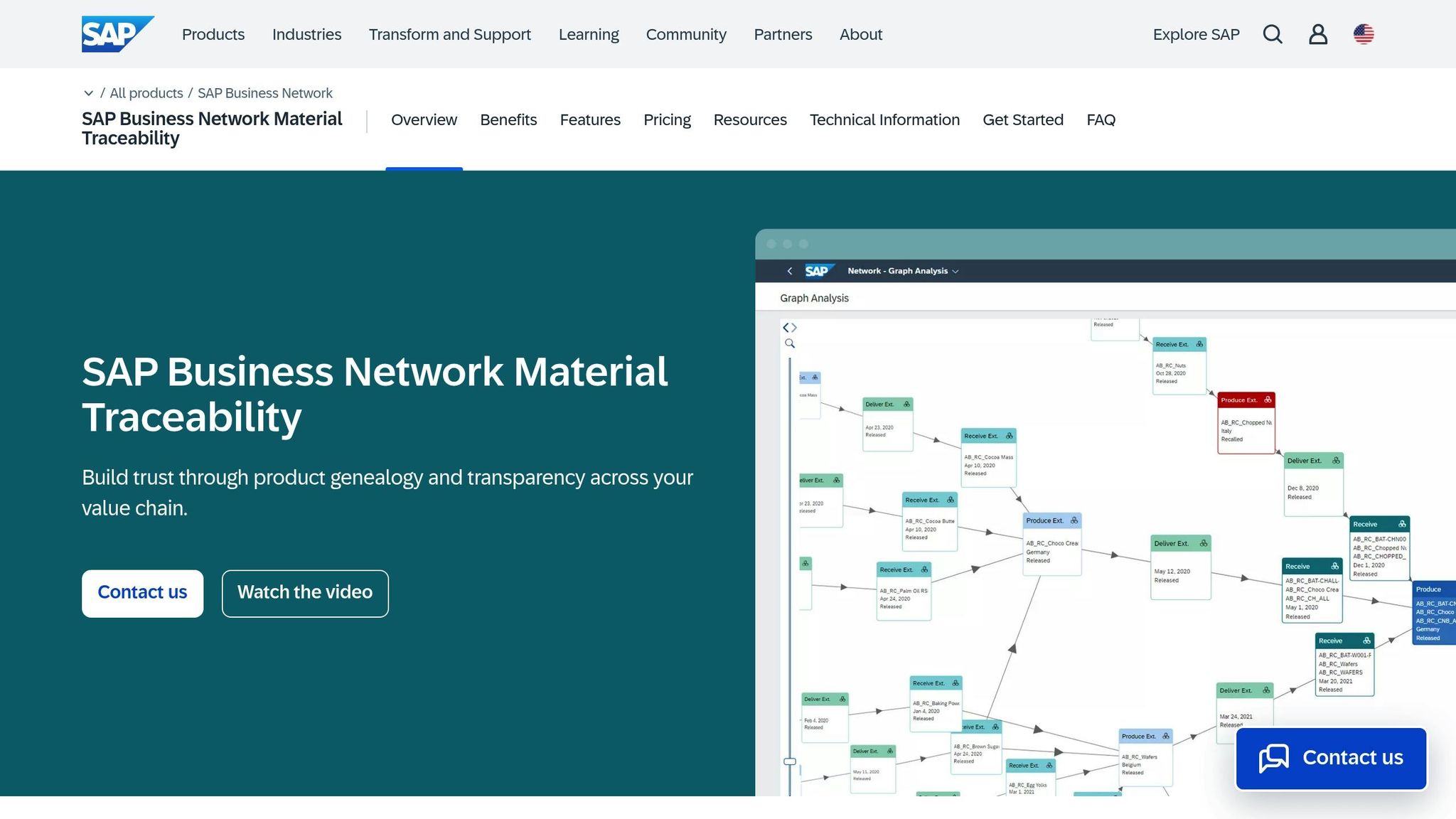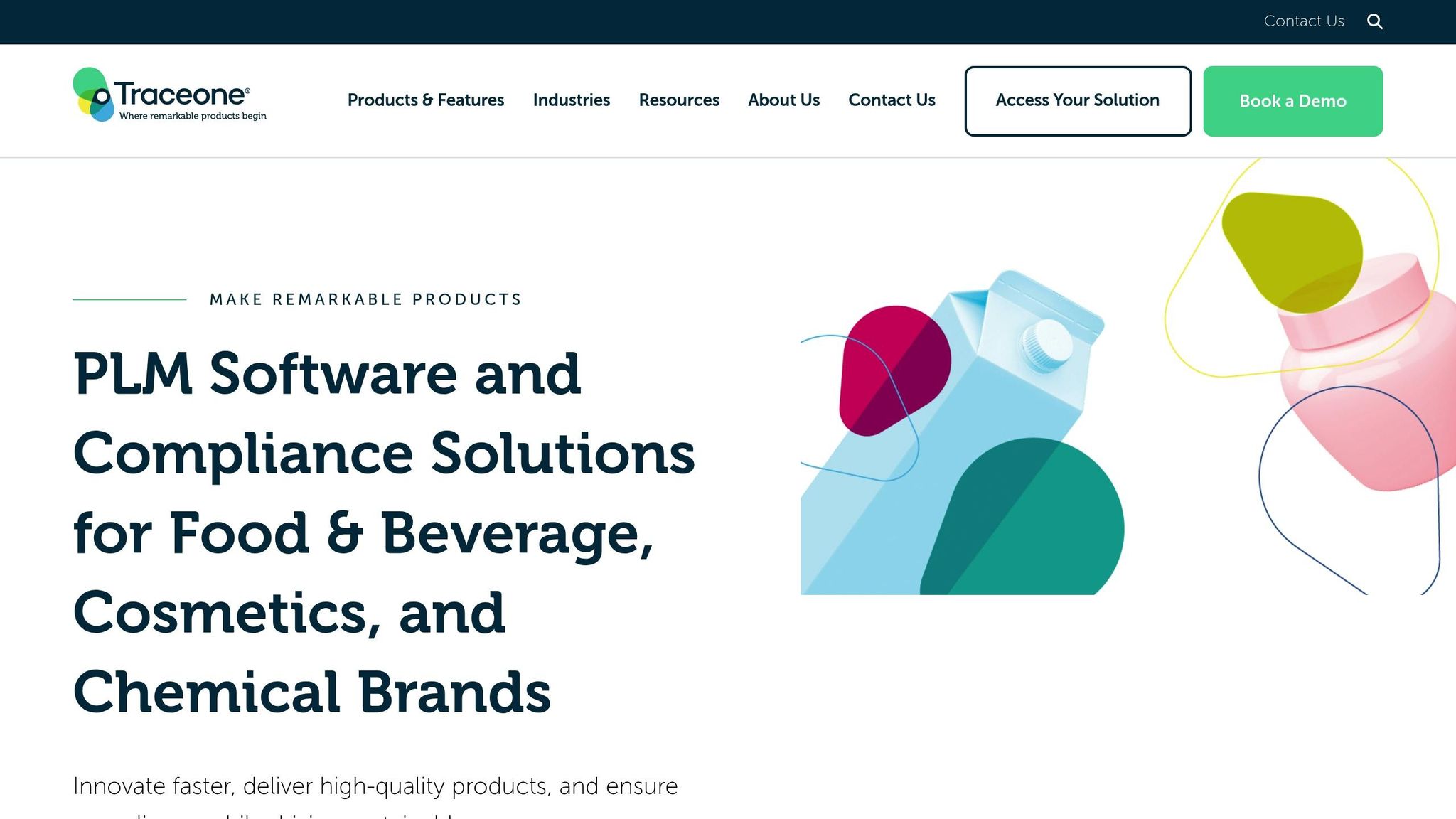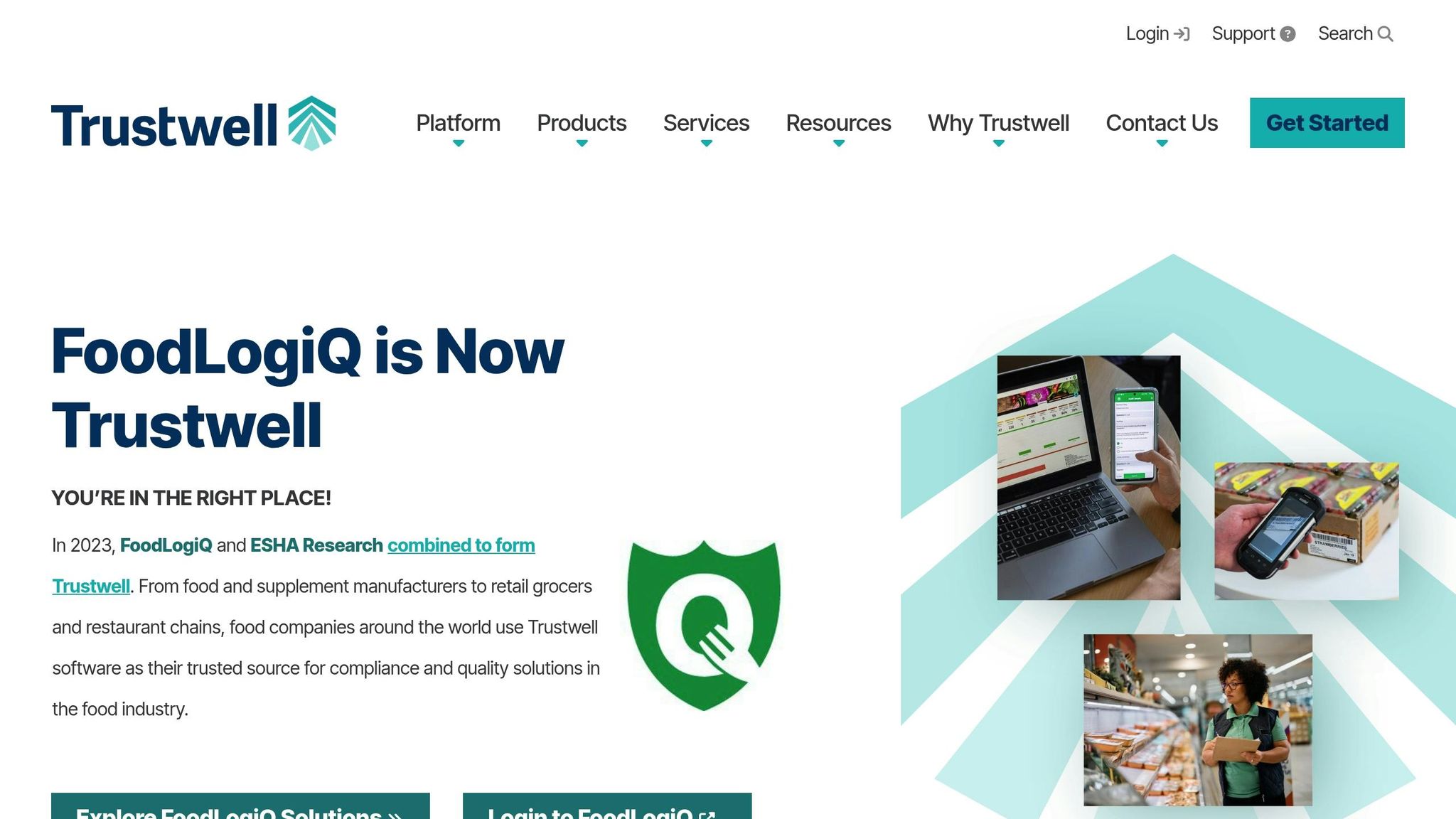Comparing Top Traceability Tools for Olive Oil Producers
Traceability tools are essential for olive oil producers to ensure product authenticity, quality, and compliance with FDA regulations like FSMA. These tools help track the journey from grove to bottle, manage supply chain data, and quickly address issues like contamination or recalls. Here's a quick rundown of the top traceability platforms:
- IBM Food Trust: Blockchain-based, offers detailed supply chain visibility with advanced data visualization and strong integration features.
- SAP Integrated Traceability: Integrates seamlessly with SAP systems, providing interactive dashboards and compliance support.
- Trace One: Focuses on supply chain visibility with customizable dashboards and efficient operations management.
- FoodLogiQ: Emphasizes real-time monitoring, recall management, and compliance, tailored for U.S. producers.
- OliveTrace: Designed specifically for olive oil producers, prioritizing regulatory compliance over advanced visualization.
Quick Comparison
| Tool | Data Visualization | U.S. Localization | Supply Chain Integration | Regulatory Compliance |
|---|---|---|---|---|
| IBM Food Trust | Excellent | Good | Excellent | Good |
| SAP Traceability | Excellent | Excellent | Excellent | Excellent |
| Trace One | Good | Good | Good | Good |
| FoodLogiQ | Good | Excellent | Good | Excellent |
| OliveTrace | Limited | Good | Limited | Excellent |
Key Takeaway: Large producers may prefer IBM or SAP for their advanced features, while smaller operations might find OliveTrace more practical for compliance needs. Mid-sized producers can benefit from FoodLogiQ or Trace One for balanced functionality and usability.
1. IBM Food Trust

IBM Food Trust leverages blockchain technology to provide detailed visibility into the supply chain, tracing products all the way from the grove to the consumer. Built on IBM's enterprise-grade infrastructure, this platform equips businesses with powerful tools for tracking and managing their products. Let’s break down its key features.
Data Visualization
The platform's dashboard simplifies complex blockchain data into easy-to-understand visuals. With interactive charts, users can monitor harvest timelines, processing stages, and distribution routes in real time. Heat maps and color-coded batch tracking highlight bottlenecks or delays, making it easier to spot and address issues quickly.
Supply Chain Integration
IBM Food Trust integrates seamlessly with all supply chain partners through direct ERP connections, automatically syncing data on harvesting, processing, and inventory.
The system also supports API connections with third-party logistics providers, ensuring automatic updates as products move between facilities. For olive oil producers working with co-packers or contract manufacturers, this integration guarantees smooth data sharing across partners while safeguarding sensitive information with permissioned access controls.
Regulatory Compliance
Meeting FDA FSMA standards is simplified with IBM Food Trust, as it generates immutable, audit-ready records and detailed chain-of-custody reports.
By storing unchangeable records on the blockchain, the platform ensures the level of data integrity that regulatory agencies demand. Every transaction is automatically timestamped, and the system maintains unalterable audit trails, giving producers peace of mind during compliance checks.
U.S. Localization
For U.S.-based producers, the platform is tailored to local needs. It tracks USDA organic certifications, supports FDA nutrition labeling, uses imperial measurements and MM/DD/YYYY date formatting, and handles pricing in U.S. dollars with compliant accounting reports. Additionally, customer support is available during U.S. business hours, with representatives knowledgeable about domestic food safety regulations.
2. SAP Integrated Traceability

Building on the success of IBM Food Trust's blockchain-powered transparency, SAP Integrated Traceability simplifies how businesses analyze and interpret data. With the SAP Business Network Material Traceability tool, users gain access to an interactive dashboard that turns complex production and distribution data into clear, actionable insights. This makes it easier to spot trends and make informed decisions faster.
3. Trace One

Trace One focuses on helping olive oil producers improve their supply chain visibility and meet compliance requirements through advanced data visualization and efficient operations management.
Data Visualization
This platform offers a real-time dashboard that producers can tailor to their needs, along with interactive reports. These tools make it easier to track operations and production trends, allowing producers to quickly identify and address any inconsistencies.
Supply Chain Integration
Trace One seamlessly connects with ERP systems and production equipment to automatically collect data throughout the manufacturing process. This ensures precise traceability records. Additionally, the platform links with logistics providers to offer real-time updates on shipment statuses and storage conditions, keeping producers informed every step of the way.
Regulatory Compliance
By recording every production step and tracking quality control metrics, Trace One simplifies the process of meeting regulatory standards and preparing for audits. It also includes alerts for upcoming compliance deadlines or deviations from expected standards. With its combination of powerful data visualization and seamless integration, Trace One stands out as a valuable tool for olive oil producers navigating a competitive market.
4. FoodLogiQ

FoodLogiQ provides olive oil producers with traceability solutions that focus on real-time monitoring and meeting compliance standards.
Data Visualization
The platform's dashboard offers customizable charts and graphs to showcase essential metrics like batch temperatures, processing times, and quality control results. These tools help producers quickly identify trends or spot deviations. With the ability to zoom in on specific time periods or production batches, users gain detailed insights into how efficiently their operations are running. This feature becomes especially useful during the harvest season when multiple pressing operations are happening at once. For U.S. producers, the platform aligns its data presentation with local standards, making it even more practical.
U.S. Localization
FoodLogiQ is tailored to meet the needs of the U.S. market. Measurements are displayed in imperial units, temperatures in Fahrenheit, prices in U.S. dollars, and dates follow the MM/DD/YYYY format. The platform also includes pre-configured FDA reporting templates and integrates with major U.S. shipping carriers like FedEx and UPS, simplifying compliance and logistics.
Supply Chain Integration
FoodLogiQ connects effortlessly with production equipment, bottling lines, and storage systems, enabling automatic data capture. It uses standardized protocols to share information directly with U.S. distributors and retailers, who often require detailed sourcing documentation.
Regulatory Compliance
The platform creates detailed audit trails and FSMA-compliant documentation, covering critical control points and corrective actions. Automated alerts for expiring products or quality issues help producers address problems quickly, reducing the risk of non-compliance.
sbb-itb-4066b8e
5. OliveTrace
While platforms like FoodLogiQ focus on offering extensive real-time monitoring, OliveTrace takes a more targeted approach. Designed specifically for olive oil producers, this traceability platform emphasizes compliance with FDA regulations and strong supplier verification processes. Instead of prioritizing advanced data visualization, OliveTrace centers its features around meeting regulatory requirements, making it an ideal choice for producers who place compliance above other functionalities.
Focus on Regulatory Compliance
What sets OliveTrace apart is its laser focus on regulatory adherence. The platform simplifies compliance by seamlessly incorporating supplier verification and preventive controls into its user-friendly framework. By generating FDA-compliant documentation and maintaining detailed, regulation-aligned records, OliveTrace ensures producers can meet federal standards with confidence. This compliance-first design strengthens supplier oversight and creates a dependable traceability system for olive oil production.
Advantages and Disadvantages
For olive oil producers juggling operational priorities and regulatory requirements, understanding the strengths and weaknesses of each platform is essential. Here's a closer look at the trade-offs associated with the leading options.
IBM Food Trust is a powerhouse when it comes to blockchain security and supply chain transparency, ideal for large-scale operations. Its advanced analytics provide deep insights, but the system's high implementation costs and technical complexity can be daunting for smaller producers. Without dedicated IT support, the steep learning curve may pose a challenge.
SAP Integrated Traceability shines in its seamless integration with SAP systems, breaking down data silos while supporting compliance and business intelligence. However, its complexity and hefty licensing fees can be a hurdle for mid-sized operations, often requiring specialized technical knowledge to fully utilize.
Trace One simplifies supplier management with an intuitive interface that reduces training time. It also excels in managing product lifecycles, making it a good fit for handling diverse olive oil varieties and seasonal production. However, its data visualization tools lag behind those of larger enterprise solutions, and advanced analytics come at an additional cost.
FoodLogiQ is a standout choice for real-time monitoring and recall management, making it a go-to for producers focused on food safety and quick response times. Its mobile-friendly design allows field teams to update records on-site. On the downside, its supply chain integration isn't as robust as enterprise-grade platforms, and some users find the extensive feature set overwhelming.
OliveTrace caters specifically to olive oil producers, offering streamlined tools for compliance and regulatory adherence. Its specialized design reduces the complexity of implementation and training compared to broader platforms. However, it falls short in areas like data visualization and third-party system integration.
| Tool | Data Visualization | U.S. Localization | Supply Chain Integration | Regulatory Compliance |
|---|---|---|---|---|
| IBM Food Trust | Excellent | Good | Excellent | Good |
| SAP Integrated Traceability | Excellent | Excellent | Excellent | Excellent |
| Trace One | Good | Good | Good | Good |
| FoodLogiQ | Good | Excellent | Good | Excellent |
| OliveTrace | Limited | Good | Limited | Excellent |
Looking at the comparisons, enterprise platforms like IBM Food Trust and SAP Integrated Traceability dominate in data visualization and supply chain integration but come with higher costs and resource demands. Mid-range options like Trace One and FoodLogiQ offer a balance of features and usability, while specialized tools like OliveTrace prioritize compliance and simplicity, making them easier to adopt.
Ultimately, the decision comes down to weighing factors like licensing fees, implementation challenges, training requirements, and ongoing maintenance. This breakdown provides a foundation for selecting the platform that best aligns with your production goals.
Final Recommendations
Choose a tool that aligns with your operation’s size, technical expertise, and specific goals.
For large-scale producers with robust IT teams, platforms like IBM Food Trust and SAP Integrated Traceability provide advanced solutions. These tools excel in data visualization and offer efficient supply chain integration to handle complex networks.
Mid-sized producers might find FoodLogiQ appealing for its focus on food safety, real-time monitoring, and mobile-friendly updates. Alternatively, Trace One supports a variety of product lines, though its visualization features are more limited.
For smaller operations, OliveTrace stands out with its straightforward, compliance-centered approach. It’s designed to reduce the challenges of implementation and training, making it an excellent choice for businesses with fewer resources.
Budget is another key factor. Enterprise-level platforms often come with substantial upfront and ongoing costs, while mid-range and niche tools are typically more affordable. Make sure the platform’s capabilities align with your priorities.
Finally, test the platform with a pilot program before fully integrating it into your workflow. This ensures compatibility and minimizes potential disruptions.
FAQs
What sets IBM Food Trust apart from SAP Integrated Traceability for large-scale olive oil producers?
IBM Food Trust vs. SAP Integrated Traceability
When it comes to improving supply chain transparency, IBM Food Trust and SAP Integrated Traceability both bring impressive capabilities to the table, but they cater to slightly different needs.
IBM Food Trust is a blockchain-based platform tailored specifically for tracking food from its origin to the consumer. It’s built with a focus on enhancing food safety, minimizing waste, and providing greater visibility across the supply chain. If your priority is end-to-end traceability for food products, this platform is a solid choice.
SAP Integrated Traceability, meanwhile, operates as part of SAP's extensive enterprise resource planning (ERP) system. It connects traceability with other business operations, enabling seamless management of supply chain data alongside other critical functions. For companies already using SAP or looking for a unified system to handle multiple processes, this solution fits the bill.
In short, your decision comes down to what your business values most: a specialized traceability network like IBM Food Trust, or a fully integrated system like SAP Integrated Traceability. Both have strengths that can align with different operational goals.
How does OliveTrace support small olive oil producers with their traceability needs?
OliveTrace caters specifically to small olive oil producers, providing an easy-to-use and budget-friendly way to track and manage production data. The app streamlines traceability processes, making it straightforward to use without the need for extensive technical expertise or expensive equipment.
By prioritizing simplicity and affordability, OliveTrace enables smaller producers to uphold quality standards while meeting consumer expectations for transparency. This lets producers concentrate on their craft - producing outstanding olive oil - while staying compliant with traceability regulations.
What should olive oil producers consider when selecting a traceability tool that fits their operation size and technical skills?
When choosing a traceability tool, olive oil producers need to think about the size of their business and their level of technical know-how. For smaller producers or those less familiar with technology, tools that are straightforward and easy to use are the best fit. These options are simpler to set up and manage. On the other hand, larger producers or those with advanced tech skills might find value in more advanced systems that can handle complex supply chain processes and offer detailed data tracking.
The goal is to select a tool that matches your operation's specific needs, helps you meet quality standards, and provides reliable traceability - all without straining your resources.

